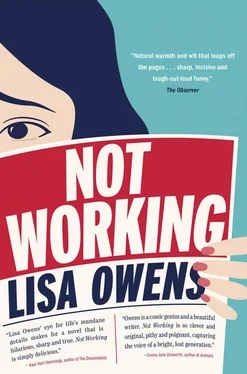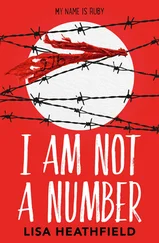There is a man standing outside my flat wearing khaki-greens and a huge “Free Palestine” badge.
“Are you the owner?” he asks, and I turn to see if he is talking to someone else, but there is no one behind me. It buys me a second to remind myself which side of the Israel-Palestine conflict I am on.
“I think so, yes,” I say, and then with more confidence, because now I’m sure, “Yes, I’m definitely the owner.”
He scratches his neck, which is gray with dirt. His ears have the same ashy hue.
“You need to get the buddleia removed. It’s a hazard.”
“Oh right,” I say, looking up to where he is pointing, to a plaster pillar on the front of the building, topped by an ornamental detail. I’ve never noticed it before, but now I’m embarrassed to see that the paintwork is cracked and filthy. If anyone had asked me to name it — if a million pounds had been resting on it — I would have guessed it was called a balustrade. “Does it not serve a structural purpose?” I say.
He stares at me, tugging on his beard, which tapers into a slender plait.
“It’s a weed. It’s not supposed to be there,” he says, and now I understand: there is a plant sprouting from the top of the thing, a spray of purple flowers. It’s quite pretty.
“And…sorry, who are you?” I ask, wondering if he is from the city council, a neighbor or an interfering passerby.
“Colin Mason, MBE,” he says and offers a dusty hand.
I hesitate for a fraction of a second before good manners kick in and I take it.
“Claire,” I say.
“Shall I deal with it, then?” he asks, nodding up at the buddleia. “I’ll do a bit of a paint job while I’m up there too.”
“Mm, just…I’m going to have to talk to my boyfriend about it first. Because we share ownership. How can I reach you?”
“I’ll be around,” he says. “You’ll see me about.”
—
I go inside to wash my hand and call Luke. A woman answers, his colleague Fiona.
“He’s scrubbing up for surgery,” she says. “Can I get him to call you back?”
“Would you mind just holding the phone to him so I can have a quick word? Two seconds, I promise.”
There’s a fumbling noise and then Luke’s voice.
“What’s up?”
“There’s a problem with our flat. A buddleia needs removing.”
“A what?”
I sigh. “It’s a weed. A purple flowering weed? The guy outside said it needs to go.”
“What guy?”
“Colin Mason.”
“Who’s that?”
“He has an MBE. He was pretty adamant.”
“So what do you want to do? Do you need to call someone? Can I leave it with you? Claire,” he says, “I’ve got to go.”
“Yes, leave it with me. What do you want to do for dinner?”
“He won’t be home for dinner,” Fiona says. “He’s going to be working late.”
“Oh,” I say. I think I’ll sit tight on the buddleia thing for a while; see if it develops.
Three women opposite talk about the weather as if it’s a friend they don’t much like.
“And that’s another thing,” says one, leaning in. “My no-tights-till-October rule has gone straight out the window.”
Her companions bob their heads, uncross and recross their nylon-clad legs.
My mother phones me on her lunch break. I can hear she’s in a cafe.
“Where are you?” she asks, as though she’s picking up a baffling background cacophony, instead of the silence in my kitchen.
“At home.”
“I see. How’s the you-know-what going?”
She means “job hunt”: calling it the “you-know-what” is, incredibly, less annoying than the question itself.
“Yep. Fine. Just trying to push on.”
“Listen, before you go, what do you make of this? I had an awful dream last night that I saw Diane, the…Diane from work. It was definitely Diane, but in the dream I thought she was someone else, a stranger.”
Until now I have only heard my mother describe her as “Diane the black receptionist.” I have a feeling there is more to come.
“Funnily enough”—this is said as though it’s just occurred to her—“I did see a woman who I thought was Diane yesterday in town, and went to say hello but then realized it wasn’t her.” She laughs. “Claire, what do you think? Do you think she would have been offended?”
“Who,” I say, because I can’t resist, “Diane or the person you thought was Diane?”
“The other lady. Not Diane. Do you think she would have known that I confused her with someone else, with another—”
“Another woman of color?” I help her out.
“Oh,” my mother says, “I don’t think that’s very PC. I don’t think you can say ‘colored’ nowadays.”
A few seats down the car, there’s an old man knitting, bald and cozy in a big white woolen cardigan. I smile at him and raise my eyebrows, and when I do, I see the earrings, purple dangly ones, and realize it isn’t an old man at all but a woman, not so old, my mother’s age maybe, who has lost all her hair. She grins at me, the needles clicking away, and I keep my eyebrows up, smiling hard at my hands, which lie still in my lap.
After the main course is cleared away, the waiters — who are really just teenagers — bring out dessert: bowls of melting ice cream and fruit swimming in syrup. I’m sitting at the children’s table with the other children. (We’re all over twenty-five.) My cousin Stuart, who beneath his suit jacket is wearing a “No Fear” T-shirt, asks me what I’m doing these days.
“I’m working that out,” I say. I’ve had a lot of wine: it keeps coming and I keep drinking it. “I quit my job two weeks ago so I could take a bit of time to try to figure out why I’m here. Not in a religious way, but I believe everyone has a purpose. Like, how you were made to be in computers. That makes total, perfect sense.” I stop, worried suddenly that he’s a normal engineer and not a software engineer, but he nods.
“Marketing wasn’t your calling, then.”
“Creative communications,” I correct him.
“Won’t lie: I never really knew what that meant.”
“It…” I prepare to launch into an explanation, then realize I may never need to again, “doesn’t matter anymore.”
“There aren’t any spoons,” Stuart says, and I beckon one of the teenagers over.
“Could you bring us some spoons, please?” I am indignant that I should even have to ask, and my tone is pleasingly chilly. The boy waiter smirks. When he comes back, he’s clutching a bouquet of knives, which he releases in a silver cascade in front of me.
“No spoons left,” he says. “No forks either. We’re really busy today.”
I shake my head. “Unbelievable,” I mutter to Stuart as we dole out the knives. I slice off some of the shrinking ice-cream island and carefully lift it to my mouth. I look across to the table where my poor grandmother is sitting. Her husband of sixty years is only just in the ground and she’s licking a speared peach-half like a lollipop.
—
During coffee, Stuart’s dad, my uncle Richard, gives a speech about Gum. He pokes gentle fun at the pride Gum took in his “war wounds”—the scars from his many operations.
“He really did love to show off his war wounds,” I say to our table. My cousins nod and smile, murmuring agreement. “And more!” I continue, pointing down at my lap and laughing. “Even after the heart op.”
Читать дальше












